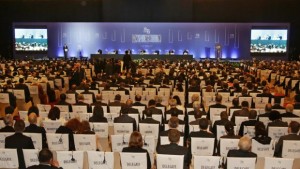Can India win friends and influence people at the WTO?
US representative has separate meeting with India!
 World trade is a big topic. And within it, the world trade in agriculture, commodities is another big area of interest to India. India is now on the cusp of a big push in becoming a number one rice exporter in the world. It is in this context we have to see what the Indonesia Bali meet of 159 countries, trade ministers and diplomats would do and achieve.
World trade is a big topic. And within it, the world trade in agriculture, commodities is another big area of interest to India. India is now on the cusp of a big push in becoming a number one rice exporter in the world. It is in this context we have to see what the Indonesia Bali meet of 159 countries, trade ministers and diplomats would do and achieve.
US is the world’s most powerful agricultural economy, you know? What does it earns?
It means many things. You have to have US on your country’s side to win any concessions on the agri/food front. India’s much-hyped Food Security Act, as everyone knows, is basically a political act; we can even call it a political ploy to win the 2014 general elections.
As such the Ninth edition of the WTO Ministerial conference in Bali, Indonesia, is facing some uncomfortable questions raised by India. The otherwise competent Indian minister Mr.Anand Sharma chose to call the non-response of the rich countries and other to India’s plea for accommodating India’s huge agri and food subsidies as unsustainable, the Indian unprecedented amount of food subsidies for the poor, call it by another name, it is the voter, rather the vote-bank politics, is at the bottom of the residence by other countries for accommodating India’s demands.
It is an open secret that all the rich countries, from American farming subsidies to the Japanese subsidies (see the last page write-up) is aimed at protecting their farmers interests. These interests are now inclusive of the native farmers’ interests and also the political tool in winning and retaining the electoral support of a huge vote bank.
In India it is a question of whether you are really protecting the farmer’s interests (it is not obvious here yet) or the voters, or the really poor?
It all depends upon the political party that supports the Act. As for the Congress it is clear that there is already some sort of also semi-permanent ration rice schemes in all states. In some states like TN and Chhattisgarhi is said that the free rice schemes work very well.
In other states to the free rice scheme is now a must for any government to win elections. So, what is new about the Sonia Gandhi-inspired Act?
In India we have a peculiar situation. The media, like the proverbial public forgets the issues once the din and noise subsides. When the Food Security Act was proposed, it was the Prime Minister who opposed it on the grounds of financial viability.
Given his peculiar situation, he had to fall in line and remain silent for the rest of the time so that the Act got passed and everyone took their political stance and also silence!
So, now for Mr.Anand Sharma to claim some conspiracy o sorts at the WTO in distant Bali are really fanciful. He is leading a 30 member delegation and the WTO had heard his arguments.
The G 33 countries are discussing how to safeguard the poor with appropriate food subsidies. Of course the US and EU give huge food subsidies besides agri subsidies to farmers.
Trade is always a disputed territory, it is a bargaining platform. Every trader, big or small, would bargain for the best terms to what he is committed. The same applies to the countries as well. Here also there are lobbies. The rich countries of course have the big pulling owner.
It is also fanciful to expect that this WTO meet one can just solve all problems and find solutions to all demands. So, trade distortion and many excuses to sidestep the critical issues are expected only.
To talk of safeguarding the subsistence farmers is also fanciful. Our subsistence farmers are always at the mercy of the rains and the private traders. The only redeeming outcome of the past many years is that at last the agri exports are looking up and we are now seeing good returns to our farmers through somewhat fair and free trade practices that are coming into increasing play.
The rich counties are urging the rest of the country participants to agree to their preferred treaty for trade facilitation. Of course, what the Indian said is also fair and truth. He said: The massive subsidisation of the farm sector in the developed countries (led by the US) is not even a subject matter of discussion, leave aside serious negotiation”.
But what alternative is there?
There are three issues on which the negotiations went on. One, a new trade facilitation treaty. Second, change in agriculture rules relevant to food security and benefits to the least developed countries. Sharma also held discussions with countries in bilateral trade matters, like for instance, with Indonesia.
What is not discussed in the Indian media in sufficient depth is the fact that WTO is worried that the huge, unprecedented subsidy amount is so distorting not only the WTO trade terms and distorting world trade principles and practices, the Indian subsidies are also distorting the Indian fiscal health.
This lack of transparency, this lack of open discussion on a wide scale in the Indian public domain is the really worrying factor in the current debate.